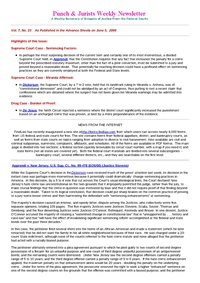Loaded on
June 1, 2000
published in Punch and Jurists
June 05, 2000
In reversing the downward departure based on the district court's belief that the facts of this case fell outside the "heartland" of cases for money laundering, the Court stated: "We find that the district court abused its discretion in departing from the guideline money laundering sentence by departing, at …
Loaded on
June 1, 2000
published in Punch and Jurists
June 05, 2000
Here the en banc court granted a rehearing to determine whether the defendant was denied his constitutional rights under the Confrontation Clause when a nontestifying co-defendant's statement that he planned and committed the robbery in question with "another individual" was admitted into evidence, even if the statement might have …
Loaded on
June 1, 2000
published in Punch and Jurists
June 05, 2000
The defendant in this case was driving a car in which the owner of the vehicle, Steven Wald, was a passenger. A state police officer stopped the vehicle for having a cracked windshield. Mr. Nava-Ramirez produced a valid driver's license and Mr. Wald produced a valid vehicle registration, but …
Loaded on
June 1, 2000
published in Punch and Jurists
June 05, 2000
Here the Ninth Circuit reversed a sentence which was significantly enhanced based on an uncharged (and highly suspect) kidnaping charge, holding that a sentence increase of the magnitude imposed requires proof by a clear and convincing standard.
This decision deals with the Guidelines’ requirement that disputed factors at …
Loaded on
June 1, 2000
published in Punch and Jurists
June 05, 2000
In this case, the defendant argued that the admitted failure to comply with the consulate notification provisions of the Vienna Convention "seriously harmed" him because he was "compelled," while in custody "to make four tape recorded statements" without an attorney, that had the consulate been informed of his rights, …
Loaded on
June 1, 2000
published in Punch and Jurists
June 05, 2000
Here the Court held that its decision in Miranda v. Arizona was of "constitutional dimension" and could not be abrogated by an Act of Congress, thus reversing the Fourth Circuit's controversial decision reported at 166 F.3d 667 (1999).
By a 7 to 2 vote, the Supreme Court held …
Loaded on
June 1, 2000
published in Punch and Jurists
June 05, 2000
While the Supreme Court’s decision in Dickerson v. U.S. case received much of the press’ attention, its decision in the instant case (which was decided on the same day) was perhaps more momentous because it potentially could dramatically change sentencing practices in America. In this decision, by a 5 …
